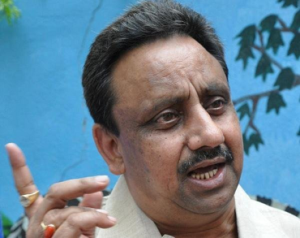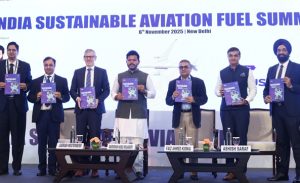- Report highlights significant improvements in adolescent well-being in India showcasing the Government’s extensive policies and programmes aimed at promoting the health and well-being of adolescents
- India has and will continue to remain steadfast in its commitment to nurturing adolescents’ talents, supporting their ambitions and empowering them to build a brighter, inclusive future for all: Shri Apurva Chandra
- “India is the first country to launch the Rashtriya Kishor Swasthya Karyakram, a dedicated program to reach out to 253 million adolescents with special focus on marginalized and under-served groups”
- “By fostering partnerships with non- governmental organizations, community leaders, and international agencies, we aim to amplify our efforts and reach every adolescent, regardless of their socio-economic background”
New Delhi. : “India has and will continue to remain steadfast in its commitment to nurturing adolescents’ talents, supporting their ambitions and empowering them to build a brighter, inclusive future for all.” This was stated by Apurva Chandra, Union Health Secretary on the occasion of the launch of “Economic Case for Investment in the Well-being of Adolescents in India” report, here today. The report builds on the global findings presented in “Adolescents in a Changing World – The Case for Urgent Investment,” commissioned by the Partnership for Maternal, Newborn & Child Health (PMNCH) released at the 77th World Health Assembly in Geneva. It highlights significant improvements in adolescent well-being in India over recent decades, showcasing the Government’s extensive policies and programmes aimed at promoting the health and well-being of adolescents.
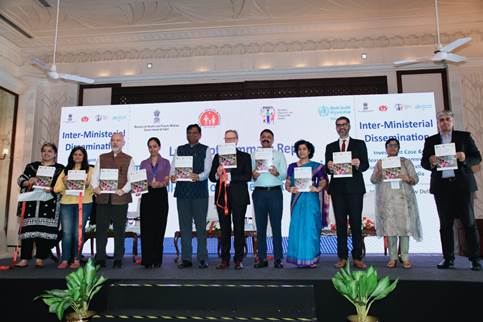
Shri Apurva Chandra said, “India has the largest population of adolescents in the world, 253 million strong, and growing. Our adolescents are the backbone of our future, embodying the promise of a vibrant and progressive nation.” Highlighting India’s unequivocal commitment to adolescents, he said, “We recognize that ensuring their health, education, and empowerment is vital to achieving our national and international development goals, including the Sustainable Development Goals (SDGs). Our government is dedicated to creating an environment where adolescents can thrive, make informed decisions, and contribute meaningfully to society.”
He also highlighted that “India is the first country to launch the Rashtriya Kishor Swasthya Karyakram (RKSK), a dedicated program to reach out to 253 million adolescents – male and female, rural and urban, married and unmarried, in and out-of-school adolescents with special focus on marginalized and under-served groups.” He said that “several strides have been made in advancing the well-being of adolescents in the country. The School Health and Wellness Programme under Ayushman Bharat aims to strengthen health promotion and disease prevention interventions for school children using trained teachers. The Scheme for Promotion of Menstrual Hygiene is focused on adolescent girls to increase awareness and promote menstrual hygiene practices.” “By fostering partnerships with non- governmental organizations, community leaders, and international agencies, we aim to amplify our efforts and reach every adolescent, regardless of their socio-economic background”, he stated.
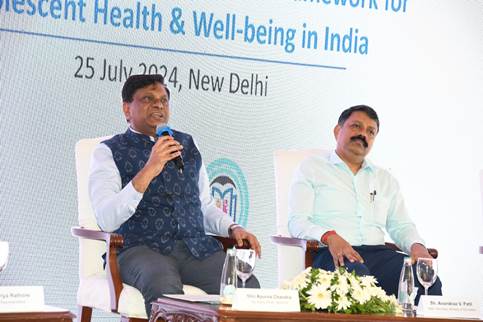
Shri Chandra also informed that India is on the cusp of launching the U-WIN platform which is modeled after the Co-WIN platform. He highlighted that the launch of the platform would lead to a transformative impact on not just storing the health records of every child but also in digitizing these records as well as in monitoring, identifying and rectifying the challenges that arise.
Shri Anandrao V. Patil, Addl. Secretary, Ministry of Education highlighted the increased budgetary allocation in school education for children and the modifications being made in the school curriculum. He emphasized that significant attention is being given towards improving skills after the 6th grade in school itself. He also stated that the government is making special efforts towards children with special needs, girl education and mid-day meals for school children. Shri Patil o noted that most schools have started promoting menstrual hygiene and the Government is reaching out in those areas where schools are yet to undertake such courses. He also informed that the National Adolescent Health Programme is being implemented in Government schools in India.
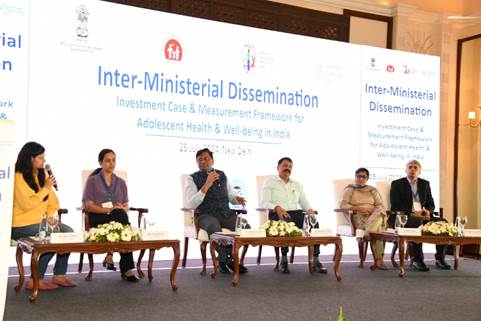
Shri Rajat Khosla, Executive Director, PMNCH noted that adolescents comprise 1.5 billion people in the world, one-fifth of which resides in India. Commending the Government of India’s initiatives towards this significant group, he pointed that adolescents face various challenges regarding violence, early pregnancies etc. He underscored the economic and social imperatives of investing in adolescents and applauded the significant amount of Rs. 2 lakh crore budgetary allocation made by the Indian Government towards adolescent’s well-being in the Union Budget 2024-25. “India is a beacon of hope not only to LMIC but to other countries across the world. India has shown that empowerment of adolescents can be done”, he remarked.
Dr Rodrigo H. Ofrin, WHO Representative to India noted that the Government of India is taking various initiatives to reap its demographic dividends. “The country has achieved important triumphs in various health indicators”, he said. He noted that convergence in various government schemes further complements the efforts towards ensuring the well-being of adolescents. He further highlighted that investing in adolescents leads to smart investment in the future of the nation. “Achieving the SDGs would not be possible without investing in adolescents”, he stated.
Prof. Bruce Rasmussen, Director, Victoria Institute of Strategic Economic Studies, Victoria University presented the key findings of the Investment Case for Adolescent Health & Wellbeing. Stating that India’s cohort of adolescents, the largest in the world will probably be the largest that India will ever have, he explained five domains of adolescent well-being including agency and resilience; safety and supportive environment; good health and optimum nutrition; learning, competence, education, skills and employability; and connectedness, positive values and contribution to society and highlighted the significant progress that India achieved in all of them. Outlining his “cost-benefit model” of research methodology, he presented an analysis of how increased intervention by the government on aspects like education, skill development and reduction of child marriage and road accidents lead to significant increase in the GDP. He also stressed that although empirical data are only available to calculate estimates of the benefit-cost ratio for seven important intervention programmes, many more interventions will also be needed to promote adolescent well-being.
Dr Yatan Pal Singh Balhara, Prof of Psychiatry, AIIMS New Delhi highlighted that a paradigm shift is being witnessed today in India where for the first time in the recent Economic Survey, there is a sharp and extensive attention on promoting mental health as well.
Dr Reena Yadav, Director, Prof. and HOD, Dept. of Obstetrics and Gynecology, Lady Hardinge Medical College highlighted the need for both education and awareness for adolescents in their upbringing. It is important to respect their right to privacy when being counseled on various sexual and reproductive health issues, she stressed.
Ms. Priya Rathore, Youth Representative from Rajasthan shared her experience of working with adolescent women facing challenges like child marriage and ground level policy support. She highlighted the need for increased monitoring and evaluation of government support at the rural and economically backward places as well as the importance of creating further awareness among adolescents on issues like menstrual hygiene.
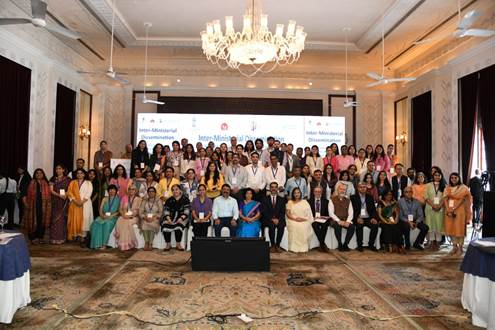
Smt. Aradhana Patnaik, Addl. Secretary and MD (NHM), Health Ministry; and senior officials of the Union Health Ministry were present in the meeting.

